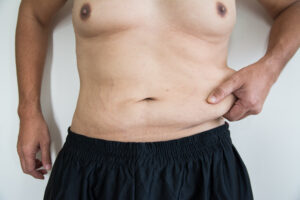Table of Contents
Fix LOOSE SKIN From Weight Loss On Keto (Cheap Options)
Weight management and the journey towards improved health can sometimes lead to an unexpected challenge: dealing with loose skin after keto weight loss and significant weight loss in general. This condition affects numerous individuals worldwide and may lead to considering various solutions, such as surgery. However, understanding the nature of loose skin and the body’s healing process is crucial before deciding on any corrective measures.
Achieving tighter skin is a gradual process, and there are certain steps you can take to progressively improve its appearance. No product or quick fix can magically tighten skin; it’s a process that requires time, patience, and a focus on nurturing yourself with the right diet. Your daily nutrition plays a pivotal role in the regeneration of your skin cells, laying the foundation for improved skin elasticity and health. Additionally, there are natural processes within the body, like autophagy, which can be harnessed through practices such as intermittent fasting, to further aid in tightening and improving the quality of your skin over time.
Importance of addressing loose skin
Addressing loose skin after keto weight loss is an important aspect of weight loss and overall health. Excess skin can have a significant impact on an individual’s self-esteem and body image, leading to feelings of self-consciousness and dissatisfaction with one’s appearance. Additionally, loose skin can pose health risks, such as increased susceptibility to skin infections and discomfort during physical activity.
From a weight loss perspective, loose skin can also affect the overall results achieved. It can conceal the progress made and hinder the achievement of a toned and defined physique. Therefore, taking proactive measures to address loose skin early on in the weight loss journey is crucial. This may include implementing strength training exercises to build muscle mass and improve skin elasticity, as well as staying hydrated and moisturizing the skin.
By addressing loose skin, individuals can boost their self-esteem, improve their body image, reduce health risks, and enhance the overall results of their weight loss efforts. It’s essential to prioritize the maintenance of skin health and take proactive measures to prevent and address loose skin throughout the weight loss journey.

Key Takeaways
- Skin tightness improves over time with a focus on consistent, healthy nutrition and lifestyle habits.
- Quality dietary choices contribute to the regeneration of skin cells, influencing skin elasticity and health.
- Autophagy, activated through intermittent fasting, can naturally support the body in improving skin tightness.
- It is important to note that not everyone experiences saggy skin following weight loss.
- Reducing sugar intake may result in less sagging skin and will lower blood sugar levels.
- There are various factors that can impact the production of collagen and elastin in the skin, including an unhealthy diet and lifestyle.
- For a keto diet, it is recommended to consume 1 gram of protein per kilogram of body weight or your desired body weight.
- Several individuals who achieve weight loss face challenges with excess skin upon reaching their goal weight.
Comprehending Skin Laxity after Weight Reduction
Reasons Behind Skin Laxity Post-Weight Loss
Your journey towards a healthier weight may sometimes lead to an unintended consequence—skin laxity. This condition often arises from rapid weight loss, suboptimal dietary history, or less-than-ideal genetic factors. As you experience a decrease in fat, your skin, which could have previously been stretched to accommodate the extra weight, may struggle to conform to your new body size.
Reduction in body fat percentage and its impact on skin elasticity
When body fat percentage is reduced, skin elasticity can be impacted due to the loss of underlying support. Collagen and elastin, which are responsible for the skin’s elasticity, can be affected by a decrease in body fat. Collagen provides structure and firmness to the skin, while elastin allows the skin to stretch and return to its original shape. A reduction in body fat percentage can lead to a decrease in collagen and elastin production, resulting in loose or sagging skin.
Maintaining adequate protein intake is crucial during weight loss to support skin elasticity. Protein provides the building blocks for collagen and elastin synthesis. Consuming vitamin C-rich foods is important as vitamin C is essential for collagen production. Additionally, incorporating omega-3 fatty acids can support skin health by reducing inflammation and improving skin hydration.
Key factors influencing skin elasticity include genetics, age, sun exposure, and hydration. To maintain skin health post-weight loss, it’s recommended to stay hydrated, protect the skin from sun damage, and incorporate strength training exercises to improve muscle tone and support the skin. Additionally, consuming a balanced diet rich in protein, vitamin C, and omega-3 fatty acids can help maintain skin elasticity.
Contributing Factors:
- Speed of weight reduction: Swift weight loss can prevent your skin from shrinking in unison with your body.
- Nutritional history: Diets lacking in essential nutrients can impair your skin’s elasticity and capacity to rebound.
- Genetic predisposition: Your genetic makeup can influence your skin’s natural elasticity.
- Poor hydration: Make sure to drink plenty of water.
Understanding Skin Elasticity and Collagen Production
The skin is our body’s largest organ and plays a crucial role in protecting us from external factors. Skin elasticity is what allows our skin to stretch and bounce back into shape, while collagen production is essential for maintaining skin firmness and reducing the appearance of wrinkles. In this article, we will delve into the importance of skin elasticity and collagen production, how they are related, and what factors can affect them. We will also explore various methods to improve skin elasticity and stimulate collagen production, including lifestyle changes, skincare products, and professional treatments. Understanding these concepts and knowing how to support healthy skin elasticity and collagen production can contribute to maintaining youthful, radiant skin for years to come.
The role of elastin fibers in maintaining skin elasticity
Elastin fibers play a crucial role in maintaining skin elasticity. These fibers are responsible for the skin’s resilience and ability to bounce back, giving the skin its youthful and firm appearance. Elastin allows the skin to stretch and contract, providing flexibility and support. However, compared to collagen, elastin makes up a smaller percentage of skin protein.
As we age, the production of elastin and collagen decreases, leading to a loss of skin elasticity and the formation of wrinkles and sagging. In addition to the natural aging process, other factors such as an unhealthy diet and lifestyle can also affect the production of elastin and collagen. Unhealthy habits like smoking, excessive sun exposure, and poor nutrition can accelerate the breakdown of these essential proteins, resulting in premature aging and loss of skin elasticity.
Maintaining a healthy lifestyle and protecting the skin from external factors can help support the production of elastin and collagen, preserving skin elasticity and overall skin health. By understanding the role of elastin fibers and the factors influencing their production, individuals can take proactive steps to maintain youthful and resilient skin.
Factors that affect collagen production in the body
Collagen production in the body can be influenced by several factors, including protein consumption, vitamin C intake, omega-3 fatty acids, collagen peptide supplementation, and intermittent fasting.
Protein consumption plays a crucial role in collagen synthesis, as collagen is made up of amino acids. Foods high in protein, such as lean meats, poultry, fish, eggs, dairy, legumes, and nuts, can support collagen production.
Vitamin C is essential for the body to produce collagen, as it is a cofactor for the enzymes involved in collagen synthesis. Consuming foods rich in vitamin C, such as citrus fruits, strawberries, kiwi, bell peppers, and broccoli, can help support collagen production.
Omega-3 fatty acids help reduce inflammation and oxidative stress, which can promote collagen production. Foods rich in omega-3 fatty acids include fatty fish (salmon, mackerel, sardines), flaxseeds, chia seeds, and walnuts.
Collagen peptide supplementation provides the body with the building blocks for collagen synthesis, supporting the body’s natural production of collagen.
Intermittent fasting has been shown to promote collagen production by increasing autophagy, which is the body’s way of cleaning out damaged cells and regenerating new ones.
In conclusion, to support collagen production in the body, it is important to include adequate protein, vitamin C, omega-3 fatty acids, consider collagen peptide supplementation, and intermittently fasting to help tighten loose skin after keto weight loss.
Importance of collagen supplements for promoting skin health
Collagen supplements play a crucial role in promoting skin health by improving skin hydration, elasticity, and density. Collagen protein powder supplements can enhance skin hydration by increasing the skin’s moisture levels, resulting in a more supple and youthful appearance. Additionally, collagen helps to maintain the skin’s elasticity, preventing sagging and wrinkles. It also contributes to the density of the skin, promoting a firm and plump complexion.
The composition of collagen in the skin provides structural integrity and firmness, making it an essential protein for overall skin health. Supplementing with collagen can help prevent loose skin, particularly when losing weight, by supporting the skin’s elasticity and preventing it from becoming loose or flabby.
Collagen supplements are crucial for promoting healthy and vibrant skin. Whether in the form of collagen protein powder or other supplements, collagen plays a vital role in improving skin hydration, elasticity, and density, ultimately contributing to a more youthful and radiant complexion.
Clarifying Myths About Quick Remedies
It is important to recognize that there are no quick fixes for addressing skin laxity. The notion that topical treatments or supplements could restore skin tightness is unfortunately misguided. Products like creams, lotions, wraps, or other similar items, despite their claims, lack scientific substantiation to prove their efficacy in resolving loose skin issues.
Ineffective Solutions:
- Creams and lotions.
- Weight-loss wraps.
- Pills, powders, or supplements claiming to tighten skin.
Effective Approaches:
- Nutrition: The skin rebuilds itself from the nutrients you consume. Consuming high-quality foods, particularly those that are organic and grass-fed, supplies the building blocks for more resilient skin.
- Cellular Regeneration: Skin cells are renewed every couple of months. Eating nutrient-rich foods contributes to the formation of skin cells that possess increased amounts of collagen, elastin, and fibrin—enhancing your skin’s firmness and elasticity.
- Autophagy: Intermittent fasting can activate a process known as autophagy, a natural mechanism of your body that helps to recycle redundant or loose skin as part of its normal tissue regulation, without resorting to surgical measures.
Table: Recommended Nutrition for Skin Repair
| Nutrient Type | Benefits for Skin |
|---|---|
| Collagen-rich Foods | Enhances skin elasticity and structure |
| Elastin-supportive Nutrients | Improves skin’s snapback quality |
| Quality Proteins | Crucial for cell regeneration |
To achieve visible improvements, aim for incremental progress, aligning dietary habits with intervals of fasting to maximize the skin’s natural reparative processes.
Adjusting Expectations for Improved Skin Condition
Anticipating the Duration of Skin’s Natural Rehabilitation
After significant weight reduction from the Keto Diet, it’s vital to have realistic expectations regarding the improvement of skin laxity. Skin restoration is gradual, and as you’re aware, there is no instantaneous solution. The progression of loose skin remodeling takes time, reflecting the months or possibly years it took to initially lose the weight.
Here’s a brief understanding of what affects the timeline of skin recovery:
- Natural Cell Turnover: Your skin renews itself every 60 to 90 days, meaning that to see improvements in texture and elasticity, patience is required.
- Quality Nutrition: Providing your body with high-grade nourishment is key. Your skin reflects your diet, so emphasize premium foods, including organic and grass-fed options. Think of this as an investment in your skin’s health.
- Intermittent Fasting: Engaging in intermittent fasting for 16-20 hours may prompt autophagy, a biological process where the body breaks down and recycles cellular components, which can help in the gradual tightening of your skin.
Nutrient Impact on Skin Condition:
| Nutrient Source | Impact on Skin |
|---|---|
| Organic, Grass-Fed Foods | Promotes collagen, elastin, and fibrin production |
| Processed, Low-Nutrient Foods | Provides less support for skin elasticity and health |
Without the allure of miraculous creams, potions, or lotions, focus on sustained, healthful habits to support skin recovery. Remember, improvements are incremental—a projected 1% enhancement every three months may seem minor, but over time it can lead to noticeable changes to your skin’s firmness.
Practical Steps for Skin Improvement:
- Prioritize sound nutrition; your diet is the foundation of your skin’s composition.
- Integrate intermittent fasting into your routine to potentially enhance autophagy.
- Maintain realistic expectations, as your skin adjusts on a natural timeline.
Nurturing Your Keto Diet’s Role in Skin Elasticity
Nutritional Support for Skin Tautness Improvement
Proper nutrition plays a critical role in the rejuvenation of your skin, especially after significant weight loss has left it appearing lax. Consuming optimal foods can aid in incrementally tightening your skin. Your skin cells renew approximately every three months, and they are entirely dependent on the quality of your diet within that period. To support skin renewal, focus on integrating nutrient-rich foods into your meal plan.
| Nutrient | Food Sources |
|---|---|
| Protein | Lean meats, fish, eggs, legumes |
| Omega-3 Fatty Acids | Flax seeds, walnuts, fatty fish |
| Vitamins C and E | Orange vegetables, citrus fruits, almonds, sunflower seeds |
| Zinc | Pumpkin seeds, oysters, beef |
Key Micronutrients and Their Sources:
- Protein: Crucial for cell regeneration; emphasis on lean meats, legumes, and eggs.
- Omega-3 Fatty Acids: Supports skin integrity; found in seeds, nuts, and certain fish.
- Vitamins C & E: Essential for collagen production; abundant in citrus fruits, nuts, and seeds.
- Zinc: Aids in tissue repair and growth; sources include seeds, shellfish, and meat.
Selecting Superior Food for Skin Revitalization
Eating top-notch foods leads to the development of higher quality skin cells with more collagen, elastin, and fibrinogen – key elements for enhancing the skin’s elasticity and firmness. Aim to incorporate organic and grass-fed options where possible, as these choices often provide a better nutrient profile that underpins the rebuilding of your skin structure.
Strategies for Elevating Diet Quality:
- Prioritize Organic: Whenever feasible, choose organic produce to reduce exposure to pesticides and potentially achieve higher nutrient levels.
- Grass-fed Meats: Select meats from grass-fed sources for higher omega-3 content.
- Hydrate Adequately: Constant hydration is essential for maintaining skin elasticity.
- Diversify Your Diet: Ensure a variety of fruits, vegetables, whole grains, and lean proteins to optimize the nutrient spectrum that feeds your skin.
Remember, diligent and informed food choices today translate into tangible skin improvements over time.
Enhancing Cellular Recycling
Understanding Cellular Cleanup Mechanisms
Your body has a natural process for cleaning up and recycling its cellular components, which becomes especially useful after substantial weight loss. This mechanism, governed by what you consume, helps manage the extra loose skin that might remain after shedding pounds. Consuming high-quality foods over several months will ensure every cell, including skin cells, is regenerated robustly, contributing to tighter and healthier skin.
Implementing Time-Restricted Eating with the Keto Diet
Introducing periods of fasting into your routine, specifically fasting for spans that extend to 16-18 hours, triggers your body’s self-digestive process beneficially for tightening skin. During these windows of not eating, your body lacks the carbohydrates that are normally available for energy, prompting it to burn fat reserves. Included in the fat reserves is the fat interspersed within your skin, which, when reduced, can result in a more tightened appearance.
Advantages of Prolonged Fasting Intervals
For a more pronounced effect on your skin’s tautness, consider lengthening your fasting intervals. When these periods reach beyond 18 hours, the natural self-recycling activity in your body is hypothesized to intensify. This can lead to approximately a 1% enhancement in skin firmness over three months. Extended fasts mirror the body’s smart strategy during food scarcity, targeting less essential tissues, such as excess loose skin, for breakdown and recycling.
| Fasting Interval | Potential Benefits |
|---|---|
| 16-18 hours | Initiates cellular recycling |
| Beyond 18 hours | Increases recycling efficiency |
| 24-hour fasts, several times a week | Accelerates skin tightening progress |
Remember, the quality of the skin you regenerate every few months can significantly improve by providing it with premium building blocks, meaning a diet comprised of the best foods you can afford. This enhances the skin’s elasticity, strength, and overall condition.
Anticipated Advances
Benefits Expected from Periodic Fasting
Your skin, in all its current state, is a reflection of your dietary intake over the last few months. Quality food consumption is crucial as it becomes the building blocks of your skin. Aim to nourish your body with the best food you can afford, optimizing for organic, grass-fed options whenever possible. Nutrition plays a pivotal role in the repair and resilience of your skin. As your dietary choices improve, so will the quality of your skin, enhancing attributes like collagen, elastin, and fibrin levels, each contributing to tighter, more elastic skin.
Autophagy, a cell-recycling process activated during fasting, particularly when fasts extend beyond 16 hours, allows your body to break down and repurpose redundant skin tissue. This biological process can gradually lead to a reduction in the appearance of loose skin as your body consumes excess fat deposits and protein within the skin. Regular intermittent fasting or extended fasting periods can lead to an estimated 1% improvement in your skin’s tightness per quarter. Be patient, as this is a gradual process, and results will vary from person to person, influenced by numerous factors, including genetics and past diet quality.
Evaluating the Decision to Opt for Surgery to Address Excess Skin Post Weight Loss
When you lose a significant amount of weight, you may find yourself with excess, sagging skin. This development is common for those who have dropped weight rapidly, have specific genetic factors, or were previously on a less-than-ideal diet. Don’t be lured by the promise of instant solutions; real change takes time.
Abandon the notion of topical fixes such as creams or lotions—they simply won’t address the underlying issue. Dismiss products like wraps as well; these are ineffective and only financially benefit the sellers. No external application can substitute for internal health when it comes to improving skin elasticity.
Focus instead on the relationship between your diet and the condition of your skin. Your skin regenerates itself approximately every three months—it’s imperative that the building blocks for this new skin come from high-quality foods. Prioritize a nutrient-rich diet, possibly enhancing skin firmness and elasticity over time.
Lastly, consider intermittent fasting, which can induce a process called autophagy. This natural process allows your body to cleanse cells, including excess skin, by digesting and recycling its own components. Gradual fasting might tighten your skin as your body turns to its own reserves for nutrients. Remember, changes from fasting will vary from person to person and depend on the consistency and duration of your fasting practices.

When should body contouring surgery be considered?
When considering body contouring surgery for loose skin after weight loss, it is important to consult with a qualified plastic surgeon. Body contouring procedures, such as a tummy tuck or arm lift, can be an effective option for individuals who have achieved significant weight loss but still struggle with extra skin.
Body contouring surgery is typically recommended when non-surgical methods, such as diet and exercise, have been unsuccessful in improving the appearance of loose skin. It is important to note that body contouring surgery is a major procedure and should only be considered after carefully weighing the risks and benefits, and consulting with a qualified professional.
Body contouring surgery can remove excess skin and tighten the remaining skin, resulting in a more sculpted and toned appearance. However, it is not a solution for weight loss or a substitute for a healthy lifestyle. It is important to maintain a stable weight before undergoing body contouring surgery, as significant changes in weight can affect the results of the procedure.
In conclusion
While there are various methods and practices that may help improve the appearance of loose skin after keto weight loss, it is important to have realistic expectations. Loose skin is a common occurrence after significant weight loss, and complete elimination of loose skin may not be possible without surgical intervention.
It is important to focus on overall health and wellness through keto diet, exercise, and lifestyle habits. Consulting with a healthcare professional or plastic surgeon can help determine the best course of action for addressing loose skin after weight loss.
FAQ’S About Loose Skin After keto Weight Loss
Will intermittent fasting or extended fasting get rid of loose skin completely?
Intermittent fasting and extended fasting can help improve the appearance of loose skin after keto weight loss by promoting autophagy, the body’s cell-recycling process. This can lead to a gradual reduction in excess skin as your body breaks down and repurposes redundant tissue. However, it’s important to note that the extent to which fasting can eliminate loose skin will vary from person to person. Factors such as genetics, past diet quality, and the consistency and duration of fasting practices can all influence the results. It is unlikely that fasting alone will completely eliminate loose skin, but it can contribute to improvements in skin tightness and elasticity over time.
Are there any topical treatments that can help with loose skin after weight loss?
Topical treatments such as creams or lotions are unlikely to have a significant impact on loose skin after weight loss. These products only address the surface of the skin and cannot address the underlying issue. It’s important to focus on internal health through a nutrient-rich diet and practices like intermittent fasting, which can promote autophagy and potentially improve skin elasticity over time.
While creams or lotions may promise to tighten loose skin, they simply won’t address the underlying issue of excess skin. These topical treatments only provide temporary improvements and do not have a lasting effect on the elasticity of the skin.
Similarly, products like wraps or other external applications are ineffective in tightening loose skin. These products are often marketed as quick fixes but do not provide any significant long-term benefits. They are more likely to benefit the sellers financially rather than helping with your loose skin.
Can Exercise help tighten loose skin after keto weight loss?
Exercise can play a role in improving the appearance and tightness of loose skin after weight loss. While it may not completely eliminate excess skin, regular exercise can help tone and strengthen the underlying muscles, which can give the skin a more firm and lifted appearance.
How important is vitamin C when it comes to skin health?
Vitamin C is an essential nutrient when it comes to maintaining healthy skin. It plays a crucial role in collagen production, which is a protein that provides structure and elasticity to the skin. Collagen helps keep the skin firm, smooth, and youthful-looking.
How to boost Collagen production?
Omega-3 fatty acids can potentially enhance the body’s collagen production through various sources such as fish oil supplements, krill oil supplements, or consumption of oily fish like salmon, mackerel, and sardines.

